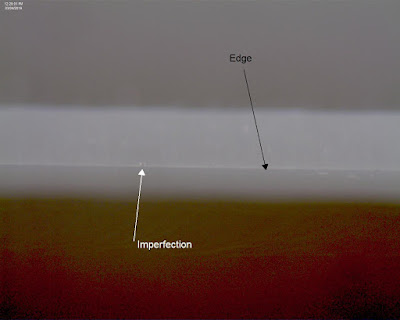Ceramic knives have amazing
edges. By amazing I mean sharp with long
term edge retention.
 |
| Basic folding ceramic pocket knife |
Ceramic knives are typically made
from zirconium dioxide (AKA zirconia).
Many manufacturers produce these blades through dry-pressing followed by
firing of powdered zirconia.
The resulting blade has a
hardness of 8.5 on the Mohs scale of mineral hardness. At the top of the scale sits diamond with a
10 while steel ranks 4.5 for normal steel
This means a ceramic knife blade is significantly harder than steel
edges. So the resultant blade stays
sharper longer. The downside is it is less
elastic and more brittle than a steel edge.
These knives are typically
designed for food preparation like slicing boneless meat, vegetables, fruit and
bread. The non-reactive nature of the
zirconia means it will not be affected by acid foods like lemons, apples or
tomatoes.
Like many minerals, zirconia
undergoes several phase transitions which can weaken the blade. Minerals like calcium, magnesium and/or
yttrium oxides can be added to stabilize the blade. These produce a white ceramic. A black-colored blade results from adding a
hot isostatic pressing step, which increases the toughness.
The blade is electrically
non-conductive and non-magnetic so it isn’t seen by metal detectors. You’ll often find small ceramic blades sold
as part of a self-extraction kit hidden in your clothing in those countries
when kidnapping is a national sport.
The factory new edge looks like this:
 |
| I'm guessing each of these defects are about 200 um in length. Could be from having blades in contact with each other at the factory. |
 |
| Looking straight down on the edge, even at +63 X magnification, the edge is difficult to find. |
But even here small defects from
manufacturing can be found. While very
tiny, they could be beginning of larger ones.
After enough years your edge will
have sections like this:
 |
| Seven year old edge,the big defect looks about the length as the new edge, but deeper. |
Dirty Harry once said a man has
to know his own limits. With care the
blade will last for years before sufficient damage forms to the blade edge making
the knife unusable. The edge photographed to show you these defects still has years of cutting left in it.
 |
| Despite the 'dull' spot this edge has plenty of life left. |
Last word, don’t try sharpening
it yourself. Even with fine diamond
powder, any uneven pressure will only cause more damage. Many of the manufacturers have a sharpening
program you can take advantage of.
No comments:
Post a Comment